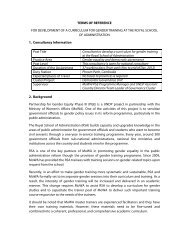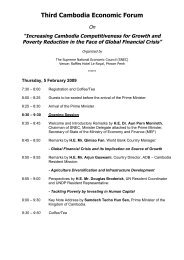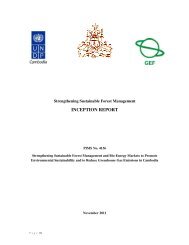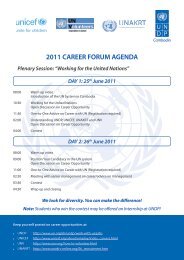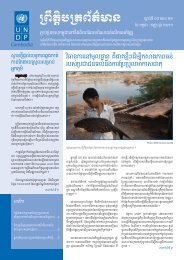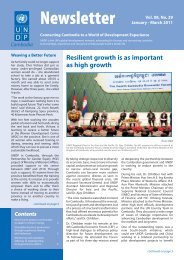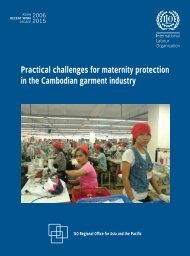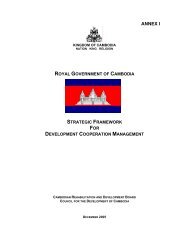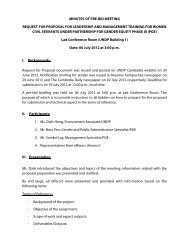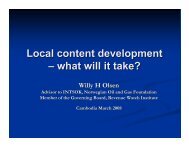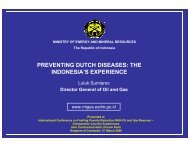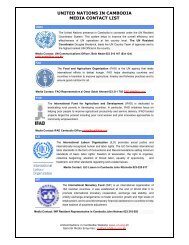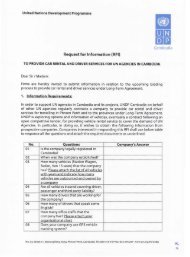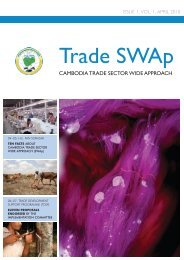UN Analysis Final.pdf - United Nations in Cambodia
UN Analysis Final.pdf - United Nations in Cambodia
UN Analysis Final.pdf - United Nations in Cambodia
You also want an ePaper? Increase the reach of your titles
YUMPU automatically turns print PDFs into web optimized ePapers that Google loves.
7.1 NATIONAL POLICIES AND PROGRAMMES IN RESPONSE TO<br />
YO<strong>UN</strong>G PEOPLE’S VULNERABILITY<br />
The Constitution of the K<strong>in</strong>gdom <strong>Cambodia</strong> is the highest law of the state. It del<strong>in</strong>eates the rights and<br />
obligations of every Khmer citizen to life, personal freedom, and security (Article 32) and guarantees that<br />
there shall be no physical abuse aga<strong>in</strong>st any <strong>in</strong>dividual (Article 38). It also guarantees the rights of children<br />
as stipulated <strong>in</strong> the CRC, particularly the right to life, education, protection dur<strong>in</strong>g wartime, protection<br />
from economic or sexual exploitation, and protection from acts that are <strong>in</strong>jurious to their educational<br />
opportunities, health, and welfare (Article 48).<br />
The Law on Marriage and Family is a fundamental guidel<strong>in</strong>e that ensures the protection of children and<br />
youth as this is aligned with Articles 5 and 18 of the CRC, which “provides a framework for the relationship<br />
between the child, his or her parents and family, and the State” (Hodgk<strong>in</strong> and Newell 2002). The law<br />
is “to regulate and protect the marriage and family, to ensure equality of the spouses <strong>in</strong> marriage and<br />
family, to strengthen the responsibility of the parents <strong>in</strong> rais<strong>in</strong>g up and tak<strong>in</strong>g care of their children,<br />
and to promote the moral and educational development of children to become good citizen imbued<br />
with a sense of responsibility for the nation and society, and the love of work” (Art. 1). In a similar<br />
way to Articles 19 and 20 of the CRC, the law provides for the report<strong>in</strong>g of violence. It states that the<br />
People’s Court can revoke parental authority if a “State organisation, the mass organisation, the authorities<br />
attached to the people’s court or any relatives of the parents” commits a fault (Art. 20). It further states<br />
that “parental power shall be revoked and transferred to any organisation or relative by blood, from parent<br />
who is at fault as follows: the parents fail to educate their child; the parents use improper power <strong>in</strong> violation<br />
of the child rights or forc<strong>in</strong>g him to commit crimes or acts aga<strong>in</strong>st society; the parents treat badly their<br />
children; or the parents behave aga<strong>in</strong>st the moral standards which have a bad <strong>in</strong>fluence over their children”<br />
(RGC 1989). A ‘fault’ relates to violat<strong>in</strong>g a child’s rights, or otherwise abus<strong>in</strong>g a child (Art. 119).<br />
The 2005 Law on Prevention of Domestic Violence and Protection of the Victim also protects children<br />
and youths. It gives local authorities the responsibility to <strong>in</strong>tervene <strong>in</strong> cases of domestic violence and<br />
allows for the issuance of protection orders required by the courts to enable them to take the most<br />
appropriate measures for victims. ‘Victims’ can be spouses, dependent children or any other person liv<strong>in</strong>g<br />
under one roof. The Law also provides a range of penalties <strong>in</strong> respect to acts of domestic violence, which<br />
are considered crim<strong>in</strong>al offences that are punishable under the Penal Law (Art. 35). It provides a legal<br />
mechanism to preserve harmony with<strong>in</strong> households <strong>in</strong> l<strong>in</strong>e with the nation’s good customs and traditions<br />
and <strong>in</strong> accordance with the Constitution (Art. 45). The Law <strong>in</strong>corporates CEDAW, which was ratified and<br />
signed by the Government <strong>in</strong> 1992. CEDAW, as a convention that protects women, is also embodied <strong>in</strong><br />
the MoWA Five-Year Strategic Plan (Neary Rattanak II). MoWA is an <strong>in</strong>tegral part of the National Strategic<br />
Development Plan 2006-2010, with responsibility for ma<strong>in</strong>stream<strong>in</strong>g gender concerns <strong>in</strong>to the plans<br />
and programmes of l<strong>in</strong>e m<strong>in</strong>istries. Four key elements have been set out <strong>in</strong> MoWA’s Plan: education;<br />
health; empowerment of women <strong>in</strong> the economic sector;, and legal protection, particularly for children<br />
and women.<br />
Other legal guidel<strong>in</strong>es that def<strong>in</strong>e the rights of <strong>Cambodia</strong>n children and youth are:<br />
The 2007 Education Law<br />
The 1998 Labour Law, particularly Article 177); states that those younger than 18-years-old should<br />
not work <strong>in</strong> hazardous labour [Article 177(2)]. For those 12- to 15-years-old engaged <strong>in</strong> light<br />
80 Situation <strong>Analysis</strong> of Youth <strong>in</strong> <strong>Cambodia</strong>



